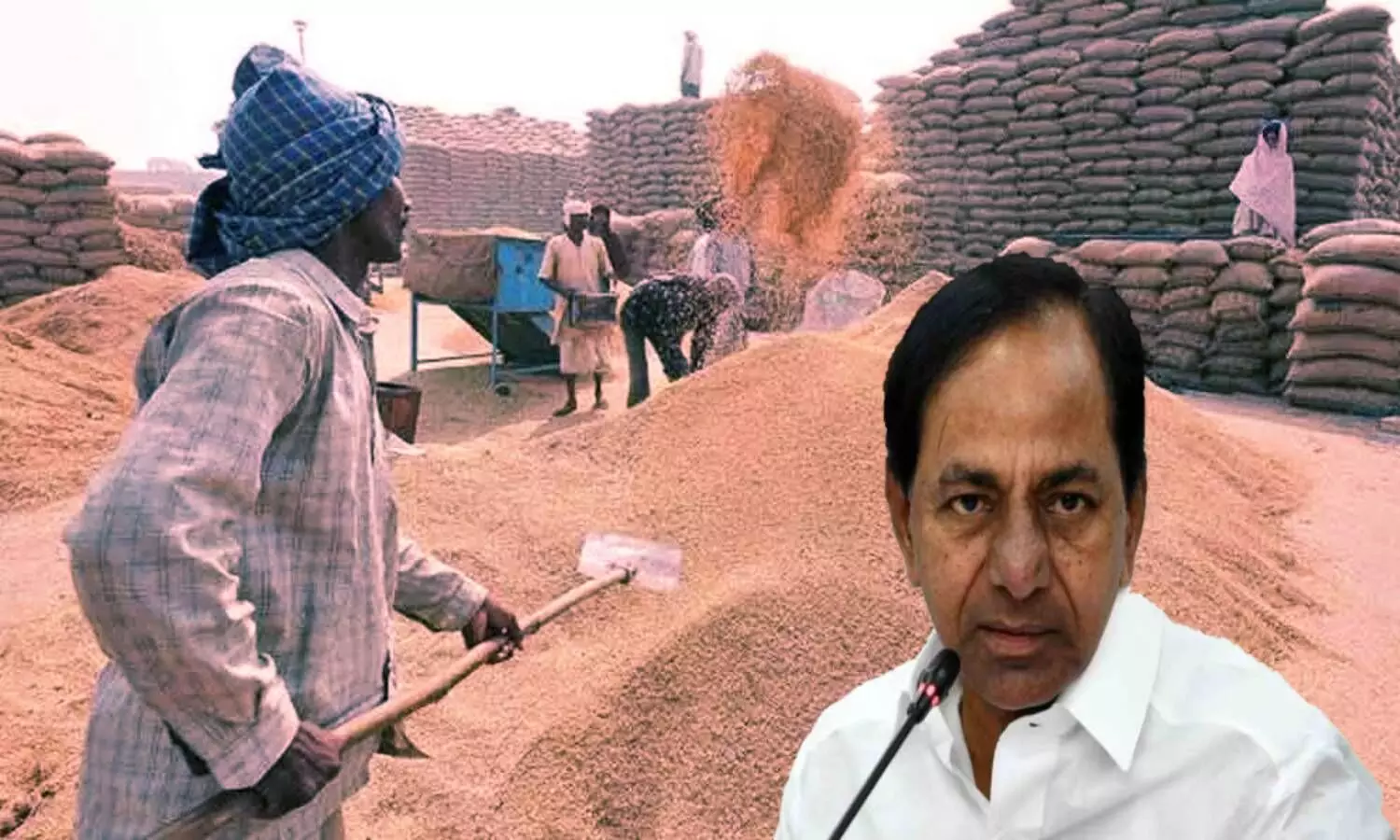Opinion: Telangana being punished for performing well in paddy production
With the Food Corporation of India refusing to purchase paddy from the state citing lack of storage space and excessive reserve stock, the farmers of Telangana are now in a quandary.
By A Saye Sekhar
Hyderabad: The Telangana Rashtra Samithi (TRS) has taken to the streets once again for the party apparently believes that it can enlist the support of all sections of society only through "inclusiveness" in public demonstrations. In a bid to deflate the pneumatic policies of the Centre, the TRS has chosen the warpath.
The TRS has always been reposing its trust in people whenever a popular cause comes under threat. Its proclivity to agitate has always helped the party make its standpoint loud and clear. While lobbying for the cause using his good offices with different political parties, TRS president K. Chandrashekar Rao never chickened out when it came to stoking a rebellion when there was a compelling need. In fact, KCR, by being nice with the BJP at the Centre, has got many things done for the state. Of course, as is his wont, he has preferred perseverance to growing restive.
The TRS, which KCR often refers to as a "party of agitations", has resorted to a public demonstration on three major occasions after coming to power in the state in 2014. After vehemently opposing the merger of seven Telangana mandals – identified to be submerged underwater due to Polavaram multi-purpose project – in Andhra Pradesh through an ordinance by the Union government, the TRS called for a state bandh. KCR was then pooh-poohed by the BJP to call a bandh while being in the government and some leaders did not hesitate to liken him to Delhi Chief Minister and Aam Admi Party chief Arvind Kejriwal.
In December 2020, TRS ministers participated in a rasta-roko (roadblock) at different places in the state, protesting the three farm Bills, stating that they were detrimental to the interests of farmers. On 12 November 2021, elected representatives of the ruling party in the state went out on the streets criticizing the indifference of the Centre in paddy procurement.
In fact, KCR has repeatedly said that TRS opted to lock horns with the Centre only after it exhausted all other available options and protest was the only ultimate democratic form available to it. Regional parties have limited scope when it comes to bargaining power with the Centre. They cannot press for their demands, as diverse problems confront different states. And each regional party has its state as a priority.
Why should FCI procure paddy from Telangana?
Paddy production in Telangana has witnessed a four-fold rise since its formation in 2014. With the Food Corporation of India refusing to purchase paddy from the state citing lack of storage space and excessive reserve stock, the farmers of Telangana are now in a quandary. The Centre's policy decision seems to have been influenced by the 'problem of plenty'. However, the Telangana government is crying foul as the Centre is applying different rules for different states and there is no uniformity.
Telangana farmers planted paddy in 62 lakh acres which was disputed by the Union minister for agriculture. However, KCR challenged this and sought to arrange a helicopter tour of the state to inspect the areas under paddy cultivation. The expected yield from the Kharif crop is 170 lakh metric tonnes of paddy that could generate 110 lakh metric tonnes of rice. Telangana is a state that is being punished for performing well, leaving the farmers high and dry.
While the offtake of five lakh tonnes of rice from the previous season from Telangana is still pending, as much as 110 lakh metric tonnes of rice from Punjab in the Kharif season is being purchased by the FCI. Telangana government is fighting this discrimination against the state.
As a matter of fact, Telangana, a new state that was formed just seven years ago, catapulted to become the granary of India. The production of paddy in Telangana in 2013-14 was pegged at 66.20 lakh metric tonnes, while it peaked to 251 lakh metric tonnes in 2020-21 (both Rabi and Kharif together). Instead of incentivizing such a progressive state, the Centre is turning a deaf ear to the requests of the state.
If the public distribution system (PDS) is so strong, there should not even be one stomach going hungry to bed in the country. Ironically, India ranked 101 in the global hunger index. What's more appalling is that the country that was hovering around 65 in its rank between 2009 and 2014, steeply fell to 80 in 2015 and in the 100s from 2017. This indicates that there is a mismatch between the hunger index and the availability of food stocks. It's unclear whether the government of India is taking a serious look at the food security and public distribution system.
If food grains are rotting in warehouses, the quality would dwindle and a lot of it could go to waste due to longer storage. The stand taken by the Centre is raising many an eyebrow with regard to the PDS. As an agrarian economy, how could India let the farm produce go to waste has become a mind-blowing question. After all, farmers are the most vulnerable section of the society, weathering the storms caused by the weather conditions, pests, crop yield, and marketing. Still, the farmers have proved to be resilient time and again.
In case, the farmers go adrift from their mainstay, there will be a day when the nation would have to face a food crisis.
Author- A Saye Sekhar is a senior journalist based out of Hyderabad. He writes on politics, business and people's issues. @sayesekhar